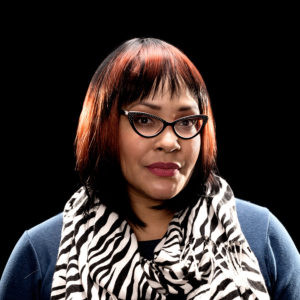Humanist Profile: Ijeoma Oluo

February is Black History Month in the United States and Canada. In commemoration we bring you a four-part series highlighting fascinating and influential black humanists. Following the lead of AHA Social Justice Coordinator Sincere Kirabo, who notes that Black History Month must go beyond the past and examine the present and future, we begin with writer, activist, and 2018 Feminist Humanist Award recipient Ijeoma Oluo.
“The same confidence that many of my friends have in the belief that Jesus walks with them is the confidence that I have that nobody walks with me.”
—Ijeoma Oluo, writing for The Guardian, October 24, 2015
Writer and activist Ijeoma Oluo was born in 1980 to a white mother, Susan Jane Hawley from Wichita, Kansas, and a black Nigerian father, Samuel Oluo. When she was two years old her father, a political scientist, returned to his village in Nigeria. He was expected to return to the United States and kept in contact for a few months, but then communication stopped. Hawley raised Ijeoma and her younger brother Ahamefule in a suburb outside Seattle, Washington, working two jobs as a single mother.
Describing her brother and herself as “black nerds raised by a white woman in a poor white neighborhood,” Oluo attended Lynnwood High School in Bothell, Washington. She later graduated from Western Washington University with a degree in political science. In a 2016 essay for Literary Hub in which she describes reconciling her Nigerian-American identity, Oluo writes:
My first memory of needing to understand the way in which socio-political power works was when I came across a newspaper headline about the Tiananmen Square protests and crackdown in 1986, when I was five. This obsession was often viewed as morbid, or at the least, very boring, by the rest of my family. When I became a teenager and learned that I could make a career out of studying how political systems work, I was extremely excited. When I realized that my father had made a career out of the very same work, I felt like maybe I hadn’t just dropped out of the sky as a baby and landed in the wrong nest.
Oluo entered a career in tech and digital marketing, married, had two boys, and later got divorced. It was after Trayvon Martin was fatally shot in 2012 that Oluo began her career as a professional writer. Her older son was the same age as Martin at the time he was killed, and Oluo was taken aback by how silent by some in her community were in the face of such injustice. She started publishing articles and personal essays at Jezebel, The Stranger, and the Guardian. Today she continues to write on feminism, racism, social justice, and gender and economic issues for those publications as well as TIME, New York magazine, Medium, and the Huffington Post. She also serves as editor-at-large for the online, female-run multimedia publication The Establishment.
On her decision to work as a freelance writer and publish largely online, Olou said in a profile at Seattle Lesbian: “Especially as a Black woman it’s really important because you have to amass enough power in your own name to be able to say ‘no.’ Otherwise, your work is continuously shaped by other people.”
Oluo was named by Seattle Magazine as one of the city’s Most Influential People of 2015 for getting “her message across with incisive wit, remarkable humor, and an appropriate magnitude of rage.” That same year she published The Badass Feminist Coloring Book. In April of 2017 The Stranger published her highly praised, in-depth interview with Rachel Dolezal (the white woman from Spokane who for years lied about being African American) in which Oluo challenged Dolezal to say how her racial fluidity was “anything more than a function of her privilege as a white person.” Oluo’s book, So You Want to Talk About Race, was published in January 2018, and in May she’ll accept the American Humanist Association’s Feminist Humanist Award at the annual conference in Las Vegas, Nevada.
Speaking about her atheism in a 2015 opinion piece for the Guardian, Oluo acknowledged that she encounters just as much racism from atheists as anyone else and cautioned against generalizing about the religious.
It’s easy to look at acts of terror committed in the names of different gods, debates about the role of women in various churches, unfamiliar and elaborate religious rules and rituals and think, look at these foolish religious folk…. Faith is not the enemy, and words in a book are not responsible for the atrocities we commit as human beings. We need to constantly examine and expose our nature as pack animals who are constantly trying to define the other in order to feel safe through all of the systems we build in society. Only then will we be as free from dogma as we atheists claim to be.
